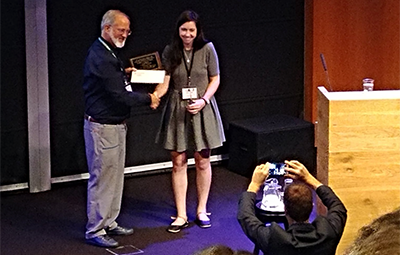The Gilbert S. Omenn Prize
The $5000 Gilbert S. Omenn Prize is awarded by the International Society for Evolution, Medicine, and Public Health for best article published in the previous calendar year on a topic related to evolution in the context of medicine and public health. The deadline for nominations is March 15, 2026.
Please use this link to submit your nomination(s).Nominations are open in the spring of each year for the best article in any peer-reviewed journal on a topic related to evolution in the context of medicine and public health with a final publication date in the previous year. The winning article is announced in May and the prize is awarded to the first author of the article at the ISEMPH annual meeting. The prize includes travel, lodging, and an invitation to present at talk at the ISEMPH annual meeting. The winner is also expected to serve on the Omenn prize committee next year.
All peer-reviewed articles that use evolutionary principles to advance understanding of a disease or disease process are eligible. The prize committee will give priority to articles with implications for human health, but many basic science or theoretical articles have such implications. Authors are encouraged to nominate their own articles, but nominations of articles by others are also welcome.
The prize is made possible by a generous donation by Gilbert Omenn, M.D., PhD. Director of the Center for Computational Medicine and Bioinformatics at the University of Michigan where he is a Professor of Internal Medicine, Human Genetics, and Public Health. Dr. Omenn served as Executive Vice President for Medical Affairs as Chief Executive Officer of the University of Michigan Health System from 1997-2002. He is a past president of the American Association for the Advancement of Science and a member of the Institute of Medicine of the National Academy of Sciences.
This year's prize committee is chaired by Norman Johnson (UMass). Other members of the committee include Lisa Abegglen, Tim Anderson, Steve Austead, Joanna Masel, and Dakota McCoy (last year's winner). Articles by author's with close associations with members of the prize committee are not eligible.
%20McCoy-23jpg.jpg)
2025 Prize for the best article in 2024
Egg donation and gestational surrogacy: Pregnancy is riskier with an unrelated embryo. Dakota E McCoy, David Haig, Jennifer Kotler. Early Hum Dev. 2024 Sep:196:106072. doi: 10.1016/j.earlhumdev.2024.106072
The first author, Dakota McCoy, Neubauer Family Assistant Professor at the University of Chicago and the Marine Biological Laboratory, will present her work at ISEMPH2025.
The Prize Committee also awarded Honorable Mention to two further papers:

Phage predation, disease severity, and pathogen genetic diversity in cholera patients, Naïma Madi et al, Science. 2024 Apr 19;384(6693):eadj3166. doi: 10.1126/science.adj3166.
Naïma Madi, Department of Microbiology & Immunology, McGill University, Montréal, Canada. McGill Centre for Microbiome Research, McGill University, Montréal, Canada

Genetic links between ovarian ageing, cancer risk and de novo mutation rates. Stasa Stankovic et al. Nature volume 633, pages608–614 (2024).
Staša Stanković, Co-founder & CEO, OvartiX, Strategy Consultant (Drug Discovery), AstraZeneca, LiveLabs, The Babraham Research Campus, University of Cambridge, Cambridge, CB22 3AT, United Kingdom
ISEMPH thanks this year's prize committee chair Norman Johnson (UMass) and the other members of the committee Ainé O'Toole, Lisa Abegglen, Steve Austad, Joanna Masel, and Tim Anderson. The prize is made possible by Gilbert S. Omenn.
2024 Prize for the best article in 2023
APOBEC3 deaminase editing in mpox virus as evidence for sustained human transmission since at least 2016, ÁINE O’TOOLE, RICHARD A. NEHER, NNAEMEKA NDODO, [...], AND ANDREW RAMBAUT, SCIENCE, 2 Nov 2023, Vol 382, Issue 6670, pp. 595-600, DOI: 10.1126/science.adg8116
The first author, ÁINE O’TOOLE, pictured left, will present the work at ISEMPH 2024.
The Prize Committee also awarded Honorable Mention to: State-dependent evolutionary models reveal modes of solid tumour growth, Maya A. Lewinsohn, Trevor Bedford, Nicola F. Müller & Alison F. Feder, Nature Ecology & Evolution volume 7, pages 581–596 (2023).
ISEMPH thanks this year's prize committee chair Norman Johnson (UMass) and the other members of the committee Lisa Abegglen, Steve Austad, Joanna Masel, and Bob Perlman. The prize is made possible by Gilbert S. Omenn.

2023 Prize for the best article in 2022
Palmer, J. D., & Foster, K. R. (2022). The evolution of spectrum in antibiotics and bacteriocins. Proceedings of the National Academy of Sciences, 119(38), e2205407119. https://doi.org/10.1073/pnas.2205407119
The first author, Jacob D. Palmer, pictured left, will present the work at ISEMPH 2023.
The Prize Committee also awarded Honorable Mention to: Two modes of evolution shape bacterial strain diversity in the mammalian gut for thousands of generations, by Frazão, N., Konrad, A., Amicone, M., Seixas, E., Güleresi, D., Lässig, M., & Gordo, I. (2022). Nature Communications, 13(1), 5604. https://doi.org/10.1038/s41467-022-33412-8
ISEMPH thanks this year's prize committee chair Caleb Finch, Committee members Koos Boomsma, Raghavendra Gadagkar, Steve Austad, Connie Mulligan, and Carol Worthman. The prize is made possible by Gilbert S. Omenn.Gilbert S. Omenn Prize Winners
2022 Prize for the best article in 2021
Randolph HE, Fiege JK,  Thielen BK, Mickelson CK, Shiratori M, Barroso-Batista J, Langlois RA, Barreiro LB (2021) Genetic ancestry effects on the response to viral infection are pervasive but cell type-specific. Science 26;374(6571):1127-1133. (not open access, but Randolph's Tweet thread provides a good summary) Haley Randolph Is a PhD candidate in the Committee on Genetics, Genomics, and Systems Biology, University of Chicago, Chicago, IL, USA in the laboratory of Luis B. Barreiro.
Thielen BK, Mickelson CK, Shiratori M, Barroso-Batista J, Langlois RA, Barreiro LB (2021) Genetic ancestry effects on the response to viral infection are pervasive but cell type-specific. Science 26;374(6571):1127-1133. (not open access, but Randolph's Tweet thread provides a good summary) Haley Randolph Is a PhD candidate in the Committee on Genetics, Genomics, and Systems Biology, University of Chicago, Chicago, IL, USA in the laboratory of Luis B. Barreiro.
The Prize Committee also awarded Honorable Mention to two other outstanding articles.
- Catania F, Ujvari B, Roche B, Capp JP, Thomas F (2021). Bridging tumorigenesis and therapy resistance with a non-Darwinian and non-Lamarckian mechanism of adaptive evolution. Frontiers in Oncology, 3645.
- Jaeggi AV, Blackwell AD, von Rueden C, Trumble BC, Stieglitz J, Garcia AR, Kraft TS, Beheim BA, Hooper PL, Kaplan H, Gurven M (2021). Do wealth and inequality associate with health in a small-scale subsistence society? ELife, 10, 1–28.
ISEMPH thanks the 2022 Prize Committee are Martin Brüne, Caleb Finch (Chair), Joachim Kurtz, Chris Kuzawa, Connie Mulligan, and Carol Worthman, and Gilbert S. Omenn for making the prize possible.
2021 Prize for the best article published in 2020
 "Accelerated reproduction is not an adaptive response to early-life adversity in wild baboons" by Chelsea J. Weibel, Jenny Tung, Susan C. Alberts, and Elizabeth A. Archie published in the Proceedings of the National Academy of Sciences Oct 2020, 117 (40) 24909-24919.
"Accelerated reproduction is not an adaptive response to early-life adversity in wild baboons" by Chelsea J. Weibel, Jenny Tung, Susan C. Alberts, and Elizabeth A. Archie published in the Proceedings of the National Academy of Sciences Oct 2020, 117 (40) 24909-24919.
The Committee also recognized three additional papers for honorable mention:
- Morley, V. J., Kinnear, C. L., Sim, D. G., Olson, S. N., Jackson, L. M., Hansen, E., Usher, G. A., Showalter, S. A., Pai, M. P., Woods, R. J., & Read, A. F. (2020) An adjunctive therapy administered with an antibiotic prevents enrichment of antibiotic-resistant clones of a colonizing opportunistic pathogen. eLife, 9, e58147.
- Crespi, B. (2020). Evolutionary medical insights into the SARS-CoV-2 pandemic. Evolution, Medicine, and Public Health, 2020(1), 314-322.
- Dieltjens, L., Appermans, K., Lissens, M., Lories, B., Kim, W., Van der Eycken, E. V., Foster, K. R., & Steenackers, H. P. (2020). Inhibiting bacterial cooperation is an evolutionarily robust anti-biofilm strategy. Nature Communications, 11(1), 107.
ISEMPH thanks this year's prize committee Caleb Finch (chair), Martin Brüne, Joe Graves, Joachim Kurtz, Chris Kuzawa, and Carol Worthman and sponsor Gilbert Omenn for making this prize possible.
2020 Prize for the best paper published in 2019 was suspended because of the pandemic
 2019 Prize for the best paper published in 2018
2019 Prize for the best paper published in 2018
Cellular hysteresis as a principle to maximize the efficacy of antibiotic therapy. Proceedings of the National Academy of Sciences, 115(39), 9767–9772. doi:10.1073/pnas.1810004115
By Roderich Roemhild, Gokhale, C. S., Dirksen, P., Blake, C., Rosenstiel, P., Traulsen, A., … Schulenburg, H. (2018).
Committee for the 2019 Omenn prize: Isabel Gordo (Instituto Gulbenkian de Ciencia, Portugal, population genetics), Mel Greaves (Institute of Cancer Research, UK, cancer); Thom McDade (Northwestern University, USA, anthropology); Steve Simpson (University of Sydney, Australia, nutrition); Nina Wale (University of Michigan, USA, infectious disease, last year's winner).

2018 Prize for the best paper published in 2017
by Nina Wale, Sim DG, Jones MJ, Salathe R, Day T, Read AFUniversity of Michigan
2017 Prize for the best article published in 2016
“More effective drugs lead to harder selective sweeps in the evolution of drug resistance in HIV-1“.
by Alison Feder, Soo-Yon Rhee, Susan P Holmes, Robert W Shafer, Dmitri A Petrov, and Pleuni S Pennings
Stanford University

2016 Prize for the best article published in 2015
“Adaptive immunity increases the pace and predictability of evolutionary chance in commensal gut bacteria”
by Joao Barroso-Batista, Jocelyne Demengeot and Isabel Gordo from the Instituto Gulbenkian de Ciencia, Portugal.
2015 Prize for the best article published in 2014
Winner: Barber, Matthew F., and Nels C. Elde. "Escape from bacterial iron piracy through rapid evolution of transferring"
Science 346.6215 (2014): 1362-1366.
Honorable Mention:
Byars, Sean G., Stephen C. Stearns, and Jacobus J. Boomsma. “Opposite risk patterns for autism and schizophrenia are associated with normal variation in birth size: Phenotypic support for hypothesized diametric gene-dosage effects.” Proc. R. Soc. B. Vol. 281. No. 1794. The Royal Society, 2014.
Pennings, Pleuni S., Sergey Kryazhimskiy, and John Wakeley. “Loss and recovery of genetic diversity in adapting populations of HIV .” PLoS genetics 10.1 (2014): e1004000.
Warinner, Christina, et al. “Pathogens and host immunity in the ancient human oral cavity.” Nature genetics 46.4 (2014): 336-344.
2014 for the best article published in 2013
Winner : Demogines, Ann, et al. “Dual host-virus arms races shape an essential housekeeping protein.” PLoS biology 11.5 (2013): e1001571.
Honorable Mention:
Alberts, Susan C., et al. “Reproductive aging patterns in primates reveal that humans are distinct.” Proceedings of the National Academy of Sciences 110.33 (2013): 13440-13445.
Graves, Christopher J., et al. “Natural selection promotes antigenic evolvability.” PLoS pathogens 9.11 (2013): e1003766.
Morrow, Edward H., and Tim Connallon. “Implications of sex‐specific selection for the genetic basis of disease.” Evolutionary applications 6.8 (2013): 1208-1217.
Huijben, Silvie, et al. “Aggressive chemotherapy and the selection of drug resistant pathogens.” PLoS pathogens 9.9 (2013): e1003578.

